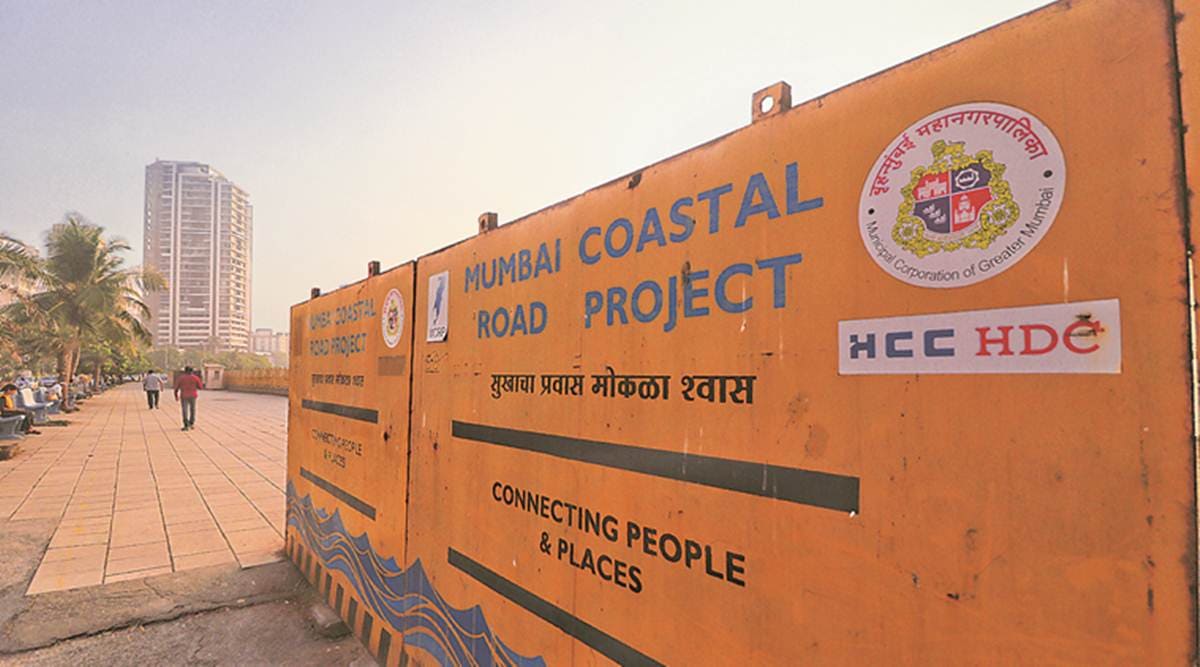 The BMC had filed two affidavits in the last 10 days informing the SC that it needs to reclaim an additional 21 hectare against the original 90 hectare.
The BMC had filed two affidavits in the last 10 days informing the SC that it needs to reclaim an additional 21 hectare against the original 90 hectare.The Union Ministry of Environment, Forest and Climate Change (MoEF) has informed the Supreme Court that the upcoming coastal road project in Mumbai requires only Coastal Regulation Zone (CRZ) clearance under the CRZ notification of 2011.
The ministry’s submission came in an affidavit filed before the Supreme Court (SC) last week while it was hearing petitions against the project.
The MoEF stand is in variance with that of the petitioners who are opposed to the coastal road on the ground that the project falls under the category of area development for which an environmental clearance (EC) is also necessary.
However, the BMC has maintained that it is a road that has been included in the city’s development plan and thus, does not require EC.
On August 18, the SC had asked the MoEF to file a detailed affidavit on the clearances granted under CRZ. The matter will come up for discussion next on Wednesday.
Civic body vs environmentalists
While BMC's ambitious coastal road project has been stuck in litigation for over an year, the new submission regarding the need to reclaim additional area in the sea has again sparked a debate. Environmentalists opposing the project say that under the garb of the coastal road, BMC is trying to create more land for future redevelopment projects. The civic body, however, maintains that the project will go a long way in minimizing the city's traffic woes.
In an additional affidavit submitted by the MoEF on September 3, it had stated that the southern part of the coastal road project attracts only provisions of 2011 CRZ notification and has been accorded a standalone CRZ clearance by the ministry with specific conditions that are germane from the viewpoint of environment and social aspects of the area.
Last July, the Bombay High Court, while quashing the CRZ clearance for the project, had said that it is an “area development project” and will require EC under the Environment Impact Assessment (EIA) Notification, 2006.
“However, no EC was obtained before construction work began. Interestingly, EC has been obtained for the northern part of the coastal road (Bandra to Versova), as the Expert Appraisal Committee (it suggests whether a project requires EC) had noted that it would fall under the ‘area development project’ category,” said Shweta Wagh, one of the petitioners against the project.
As per Section 8b of the EIA notification of 2006, a project covering an area of more than 50 hectares or built up area of more than 1.50 lakh sq m are appraised as category ‘B1’, and requires EC.
For the 9.98-km coastal road project from Princess Street to Worli end of Bandra-Worli Sealink, the BMC wants to reclaim 111 hectares into the sea.
Wagh said that a study by National Institute of Oceanography on coastal flora and fauna was started after the CRZ clearance was granted. “In case of impact on fishermen and fishing areas, the BMC started a study after reclamation was commenced. While the work on the coastal road began in October, 2018, the Central Marine Fisheries Research Institute started the study only last August,” she added.
Environmentalist and another petitioner, Debi Goenka, said: “The SC has not set aside the judgment of the Bombay High Court. It has given an ad-interim stay and allowed BMC to reclaim only 20 hectare required for the road. In the last hearing, BMC counsels had argued that the project doesn’t need EC, as it has already complied with EIA norms. But the ministry’s affidavit clearly says that both EC and CRZ are two different things.”
The BMC had filed two affidavits in the last 10 days informing the SC that it needs to reclaim an additional 21 hectare against the original 90 hectare.